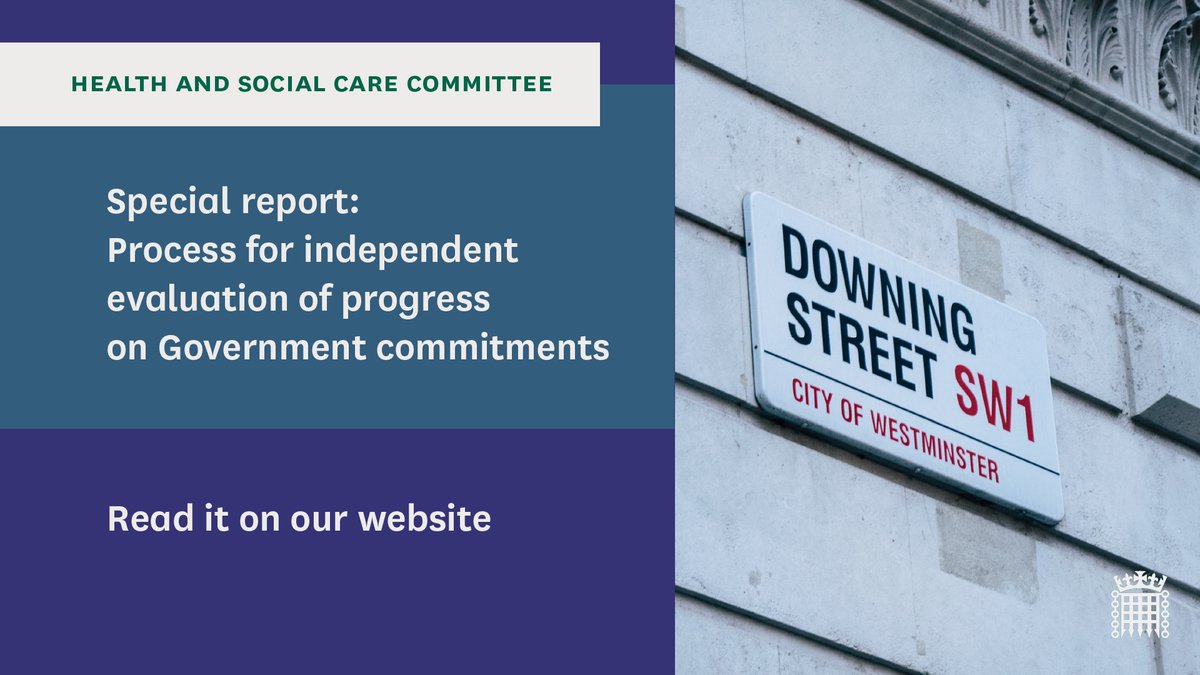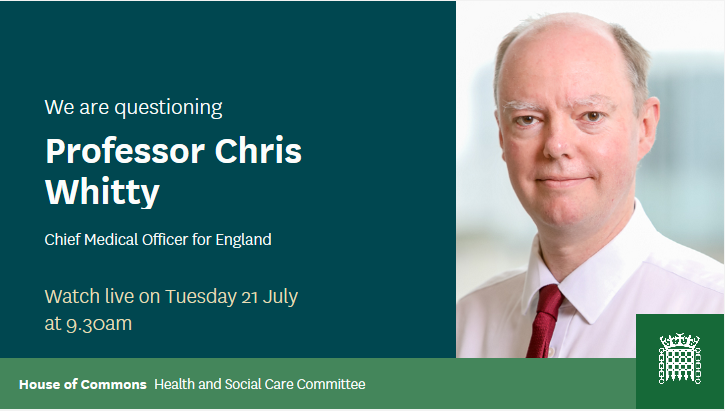
Our next #COVID19LessonsLearnt session with @CommonsSTC is starting soon. We'll be discussing test, trace and isolate.
Watch live: parliamentlive.tv/Event/Index/60…
Follow for live tweets 👇
Watch live: parliamentlive.tv/Event/Index/60…
Follow for live tweets 👇
https://twitter.com/CommonsHealth/status/1324755846706987008
@profchrisham says the difficulty we've had with contact tracing is that the Government has built a test, trace and isolate system too biased towards the national level, and was too late in providing resources and staff at the local level where most of the effective work happens
He adds that there has been a shift from the national to local but it's been too slow, and if the Government had moved more quickly over the summer to shift contact tracing locally, we'd be in a better place now #COVID19LessonsLearnt
Discussing the decision to stop community testing and contact tracing in March, @profchrisham describes this as a sad decision but says it was necessary due to a lack of testing capacity. Prof Dame Anne Johnson points out the importance of isolation during this time
Asked whether we're expecting too much of contacting tracing, Prof Dame Anne Johnson agrees with @profchrisham that summer was the time to use local teams to get on top of outbreaks. She says it has to be matched with isolation, enabled by physical, social and financial support
@profchrisham agrees that testing, tracing and isolating need to work together seamlessly. Prof Dame Anne Johnson emphasises the need to have clear and consistent messaging about individual responsibilities, as well as working directly with different communities
@BWDDPH says we need unambiguous guidance - over the summer control measures were changed with rapid frequency, causing confusion among affected populations. He says we need a simple set of guidelines, particularly for areas that will continue to have high rates transmission
@BWDDPH outlines Blackburn with Darwen's local approach which has an 89% success rate. He says people respond better to a local number and local voice; those running the system known the local community well, particularly BAME communities, and can provide wraparound support
He says if locally they had the same proportionate level of resource as the national contact tracing team, Lancashire would have 600-700 staff, which would make a transformational difference. He argues for a blended system with some national resource but more locally
@BWDDPH says national Test and Trace seems to work relatively well in more affluent communities, but amongst poorer communities and BAME communities such as in Blackburn and Darwen, its success rates are very low.
@BWDDPH suggests people may be underreporting contacts to national Test and Trace to protect them from self-isolating. He calls for a stronger system of support & welcomes the £500 payment for people self-isolating, which is being highly utilised in his area #COVID19LessonsLearnt
We are now moving onto question our second panel, including @JoMartin_path, Professor Sir John Bell and Professor Dr Gerard Krause, @Helmholtz_HZI
Keep following for live tweets 👇
Keep following for live tweets 👇
Professor Sir John Bell is asked about his optimistic comments yesterday about the Pfizer candidate vaccine - he says there are challenges but people shouldn't underestimate the importance of the announcement: there are many pathogens we haven't found a vaccine for after decades
John Bell reiterates that he thinks we have a 70-80% chance of things being back to normal by Easter - provided there aren't significant problems with vaccine distribution
Professor Sir John Bell and @JoMartin_path agree that there is significant potential for population level testing using new technologies - but there are challenges including making sure we have enough equipment, making sure tests are distributed effectively, and effective IT
Asked about the scaling up of lab capacity through smaller labs, @JoMartin_path says smaller NHS labs were desperate to ramp up testing in the early part of the pandemic but faced significant constraints, especially in the supply of testing materials #COVID19LessonsLearnt
@JoMartin_path says NHS pathology labs process 1.1bn tests per year so they were well set up for high volume testing. She says the decision to set up independent labs, where data didn't flow well into the NHS and public health, is something we've learnt from #COVID19LessonsLearnt
Professor Sir John Bell and @JoMartin_path both agree that the use of rapid population testing is not a risk removal strategy and must sit alongside other appropriate infection control such as PPE use in the NHS and social distancing
@JoMartin_path is asked about how to use new lab capacity in the future - she says this won't be our last pandemic, so we will always need stand-up capacity for major incidents and major disease outbreaks. She adds that progress in IT infrastructure has been a major success
Professor Sir John Bell says that rapid testing can support contact tracing and isolation - isolating contacts is not very effective but is difficult for people asked to isolate. Rapid tests could be used to test contacts of positive cases to release them from isolation
Professor Dr Gerard Krause @Helmholtz_HZI says it may be too early to judge why - and whether - Germany has performed better during the pandemic. But he says that German healthcare is very de-centralised which enabled testing capacity to be upscaled very quickly
He says running a PCR test is not magic - and in Germany there was never a notion that one centralised lab would claim to be the only one to know how to run COVID tests. He adds that there were financial incentives for smaller labs to run COVID tests #COVID19LessonsLearnt
Prof Dr Gerard Krause also adds that contact tracing in Germany has been core part of the strategy from the outset and throughout - and has been the responsibility of local public health departments. Despite decades of underfinancing and understaffing, they have done a good job
Prof Dr Gerard Krause says local health departments are responsible for compensating people asked to self-isolated, but this hasn't been claimed often because of wider aspects of employment support such as 'short work' where the Government tops up part time salaries to full time
The final panel of this morning's #COVID19LessonsLearnt session is now beginning.
We are questioning @didoharding and @SMHopkins from NHS Test and Trace.
Keep watching and following live tweets: parliamentlive.tv/Event/Index/60…
👇
We are questioning @didoharding and @SMHopkins from NHS Test and Trace.
Keep watching and following live tweets: parliamentlive.tv/Event/Index/60…
👇
@didoharding says she thinks that local and national contact tracing is not an either/or choice but that both parts of the system are important and should both be funded effectively #COVID19LessonsLearnt
Asked why we failed to prevent a second wave despite increased test and trace capacity, @didoharding points out we are in a different position to March where the 'R' number was much higher. @SMHopkins says that even in the summer when cases were low there was still transmission
@didoharding outlines the various challenges at all stages of ensuring an effective test trace and isolate system, though she suggests that the system is continuing to improve. On isolation she says 54% of people do isolate but when they don't it's usually for legitimate reasons
Asked about the need for the state to support isolation, @didoharding agrees that financial support is important because when people don't isolate it is for reasons like needing to provide for their families. But she says the amount of support is a matter for the Govt
@didoharding says she doesn't think testing capacity could have been scaled up any quicker over the summer than it was and suggests anyone who wants a test, anywhere across the country can get a test today - with an average travel of below 3 miles in England
@didoharding rejects the idea that NHS Test and Trace didn't predict an increase in demand in September when schools returned, but says they may not have got the scale of increase right. She says she defers to clinical experts in predicting when the next demand increase will be
@SMHopkins says winter will increase demand due to increased amounts of colds, flus and winter illnesses with similar symptoms to covid. NHS Test and Trace has capacity for 500k tests per day but will need more, so is focusing on rolling out rapid tests to health and social care
Asked about private sector involvement in Test and Trace, @didoharding says she believes they are procuring things professionally and efficiently. She says the service benefits from the same rates that the Government has negotiated with companies as part of the Covid response
Asked about national versus local contact tracing, @didoharding confirms local tracing has achieved close to 100% contact rates compared to 50% nationally, and the rates have been relatively stable. But she says the national system is dealing with much higher volumes
@didoharding says that testing volume was prioritised during September because of increasing demand, but turnaround are now being prioritised and are improving week on week. She says that last week just under 60% of care home tests came back within 48 hours
@didoharding says that Test and Trace has delivered on all of its commitments including available testing capacity and the number of testing sites. But she says that there are areas for improvement including turnaround times and contact tracing
Asked again about supporting people to self-isolate, @didoharding says Test and Trace was advocating for increased financial support before the £500 payment was announced recently, and worked with local authorities to improve signposting to local resources
@didoharding acknowledges SAGE advice that testing and contact tracing has to happen within 72 hours to be effective but says that she can't give an average for the proportion within 72 hours that Test and Trace is achieving - developing this figure is a priority, she says
@didoharding says her and her team is still focussed on covid, but agrees that we have built a very large diagnostic industry and says it's important to make sure the country benefits from that going beyond covid, including treating other diseases #COVID19LessonsLearnt
Our joint #COVID19LessonsLearnt session with @CommonsSTC on Test and Trace is now finished.
Thank you to all of our witnesses.
📺Watch the session back: parliamentlive.tv/Event/Index/60…
📗And look out for the transcript.



Thank you to all of our witnesses.
📺Watch the session back: parliamentlive.tv/Event/Index/60…
📗And look out for the transcript.




• • •
Missing some Tweet in this thread? You can try to
force a refresh




